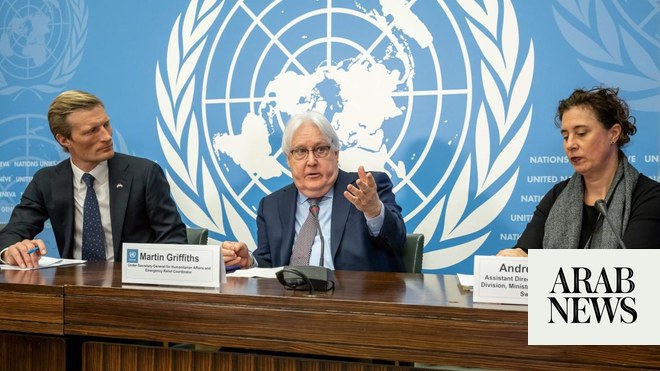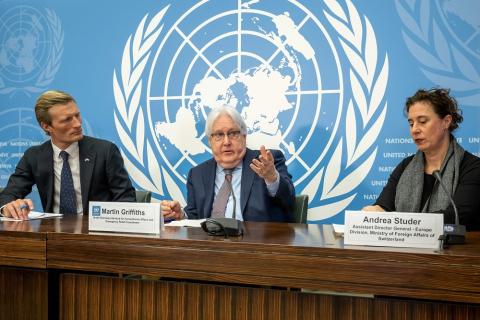
More than 21 million people in Yemen, or two-thirds of the country’s population, need help and protection: OCHA
Monday’s high-level gathering is co-hosted by Sweden, Switzerland, and the UN in the organization’s Palais des Nations in Geneva
CAIRO: Global donors on Monday pledged about $1.2 billion at a conference aimed at generating funds to help millions of people in Yemen suffering from the fallout of an eight-year war, a UN official said. The amount is far below a target of $4.3 billion set by the United Nations to stave off one of the world’s worst humanitarian crises.
More than 21 million people in Yemen, or two-thirds of the country’s population, need help and protection, according to the UN Office for the Coordination of Humanitarian Affairs, or OCHA, which says the humanitarian needs in Yemen are “shocking.” Among those in need, more than 17 million are considered particularly vulnerable.
“The people of Yemen deserve our support. But more than that, they deserve a credible path out of perpetual conflict and a chance to rebuild their communities and country,” said UN Secretary-General Antonio Guterres, addressing the donors.
The UN Humanitarian Affairs and Emergency Relief Coordinator Martin Griffiths said they received 31 pledges at Monday’s conference, totaling about $1.2 billion. He said the UN hopes to collect more funds throughout the year to help cover its needs.
The high-level gathering was co-hosted by Sweden, Switzerland, and the UN in the organization’s Palais des Nations in Geneva. It was attended by high-level officials from across the world including the US Secretary of State Antony Blinken and Germany’s Foreign Minister Annalena Baerbock.
Baerbock was the first to announce a pledge, saying her country will provide 120 million euros ($127 million) to Yemen’s 2023 humanitarian response.
“This terrible humanitarian disaster is one the world repeatedly and much too often has almost closed its eyes to,” she told reporters in Geneva.
In his speech to the conference, Blinken called on donors to step up their contributions to meet the humanitarian demands in Yemen, pointing to last year’s funding shortages that forced UN agencies to scale down operations including food rations for thousands of families. He said the US will provide more than $444 million in humanitarian assistance to Yemen in 2023.
“The scale of the challenge we face is daunting. But I urge everyone to keep our focus on the people we seek to help,” he told the conference.
“To date, our support, combined with the continued benefits and relative calm created by the UN-brokered truce, enabled 2.2 million Yemenis to avoid experiencing acute food insecurity and tens of thousands of others to avoid slipping into famine-level conditions,” Blinken said.
He urged the international community to do everything it can to help – including through providing support to the Yemen humanitarian response – to build further positive momentum and ensure Yemenis see the tangible benefits peace can bring.
Blinken also called for an end to restrictions on humanitarian workers and operations, especially in Houthi-controlled areas where the militia restricts the movements of female aid workers by forcing them to be accompanied by male guardians.
The $4.3 billion appeal for 2023 is almost double the $2.2 billion that the UN received in 2022 to fund its humanitarian program in Yemen. The UN had sought $4.27 billion for 2022.
Monday’s conference comes as the global economy remains rattled by the yearlong Russian invasion of Ukraine. Inflation rates have surged over the past year across the world, forcing many governments to focus on elevating the needs of their own people.
Yemen’s conflict started in 2014, when the Iran-backed Houthis seized the capital, Sanaa, and much of the country’s north. The Coalition to Restore Legitimacy in Yemen intervened months later, in early 2015, to try and dislodge the militia and restore the internationally recognized government to power.
The conflict has killed more than 150,000 people, including over 14,500 civilians. The war has also created a horrendous humanitarian crisis, leaving millions suffering from food and medical care shortages and pushing the country to the brink of famine.
The conference is taking place as the warring sides continue to observe an informal and fragile cease-fire. Efforts are underway to declare a new truce after the parties failed to renew a UN-brokered truce in October.
“We have a real opportunity this year to change Yemen’s trajectory and move toward peace, by renewing and expanding the truce,” Guterres, the UN chief, said.
The truce, which took effect in April, brought some relief for Yemenis, especially in Houthi-held areas. It enabled commercial traffic to resume at Sanaa’s airport and the sea port of Hodeida.
However, partly because of the territorial division — with roughly half of Yemen under Houthi control and the other half under government control — the country is haunted by an economic crisis. There is dual system of currency, dual exchange rates, restrictions on imports and double taxation on goods, according to the UN Panel of Experts investigating Yemen’s conflict. Annual inflation reached 45 percent, and food prices surged 58 percent, according to the panel’s report.
There have also been Houthi attacks on oil facilities in government-held areas, resulting in the disruption of oil export, which is a major source of funds for the government.
The war has decimated the country’s civilian infrastructure including its health care system. Hospitals and medical facilities have repeatedly been attacked.
“Yemen requires urgent and robust support from international donors and other partners to effectively avert the potential collapse of its health system,” said Adham Ismail, the World Health Organization’s representative in Yemen.
He said $392 million was needed for WHO-led operations in 2023 to ensure health facilities remain functioning and provide “even the most basic services to the 12.9 million most vulnerable people.”
Climate change has added to the suffering. Yemen, located at the southwestern corner of the Arabian Peninsula, is “at the forefront” of a global climate crisis, as natural disasters, including floods and arid weather, threaten lives, the UN has said.











